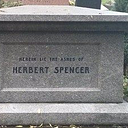Herbert Spencer’s superb understanding of all things science(biology/chemistry/physics/etc.) and the evolutionary processes that create the biological world shaped his mind to notice the same evolutionary processes acting on all natural phenomena including society and what he called the social organism. He clearly understood how the order which emerged out of the actions of free individuals in the private sector created a vastly more productive social order than the law-made one of government bureaucracies. In the following page-and-a-half Spencer pretty much explains how evolutionary forces are what create society and how clueless mankind is of this fact. It is the last two thirds of a small essay titled “Spontanenous Reform”[text between brackets mine] where Spencer writes about the great changes during the Industrial Revolution:
“What has produced the transformation which has since taken place? Not legislation, not stern repression, not coercion. The improvement has slowly arisen, along with other social improvements, from natural causes. The vis medicatrix naturce has been in operation. But this large fact and other large facts having like implications are ignored by our agitators[politicians]. They cannot be made to recognize the process of evolution resulting from men’s daily activities, though facts forced on them from morning till night show this in myriad fold ways. The houses they live in, their furniture, clothes, fuel, food — all are brought into existence by the spontaneous efforts of citizens supplying one another’s wants. The pastures and cornfields they travel through, cover areas originally moor and bog, which have been transformed by individual enterprise. The roads, the railways, the trains, the telegraphs, are products of combined exertions prompted by desires for profit and maintenance. The villages and towns they pass exhibit the accretions due to private actions. The districts devoted to one or other manufacture have been so devoted by men who were simply seeking incomes to live upon. The enormous distributing organization with its vast warehouses and retail shops lining the streets, carrying everywhere innumerable kinds of commodities, has arisen without the planning of any-one. Market towns, large and small, have without forethought become places of periodic exchanges; while exchanges of higher and larger kinds have established themselves in London, where, from hour to hour, you may feel the pulse of the world. So, too, by spontaneous co-operation has grown up that immense mercantile marine, sailing and steaming, which takes men everywhere and brings goods from all places.
And no less are we indebted to the united doings of private individuals for that network of submarine telegraphs by which there is now established some-thing like a universal consciousness. All these things are non-governmental. If we ask how arose the science which guided the development of them, we find its origin to have been non-governmental. If we ask whence came all the multitudinous implied inventions, the reply is that their origin, too, was non-governmental.[One should keep in mind that while England was overflowing with innovation and leading the way in the Industrial Revolution, the government had nothing to do with any sort of ‘Science’ education or the funding of scientific research like it does today] Of the Press, daily, weekly, monthly, we still have to say it is non-governmental. It is so with the great torrent of books continually issuing, as well as with the arts — music, painting, sculpture, in their various developments — and with the amusements, filling hours of relaxation. This vast social organization, the life of which we severally aid and which makes our lives possible by satisfying our wants, is just as much a naturally-developed product as is the language by which the wants are communicated. No State-authority, no king or council, made the one any more than the other. The ridiculous Carlylean theory of the Great Man and his achievements, absolutely ignores this genesis of social structures and functions which has been going on through the ages. The deeds of the ruler who modifies the actions of his generation, it confounds with the evolution of the great body-politic itself, of which those actions are but incidents. It is as though a child, seeing for the first time a tree from which a gardener is here cutting off a branch and there pruning away smaller parts, should regard the gardener, the only visible agent, as the creator of the whole structure: knowing nothing about the agency of sun and rain, air and soil. Undeveloped intelligences cannot recognize the results of slow, silent, invisible causes.
Education and culture as we now see them, do nothing to diminish this incapacity but tend rather to increase it. In so far as they are more than linguistic, the “Humanities,” to which the attention of the young is mainly given, are concerned with personalities. After the traditional doings of gods and heroes, of great leaders and their conquests, come the products of the poets, of the historians, of the philosophers. And when study of earlier ages is supplemented by study of later ages, we find the so-called history composed of kings’ biographies, the narratives of their conflicts, the squabbles and intrigues of their vassals and dependents. In the consciousness of one who has passed through the curriculum universally prevailing until recently, there is no place for natural causation. Instead, there exists only the thought of what, in a relative sense, is artificial causation — the causation by appointed agencies and through force directed by this or that individual will. Small changes wrought by officials are clearly conceived, but there is no conception of those vast changes which have been wrought through the daily process of things undirected by authority. And thus the notion that a society is a manufacture and not an evolution, vitiates political thinking at large; leading, as in the case which has served me for a text, to the belief that only by coercion can benefits be achieved. Is an evil shown? then it must be suppressed by law. Is a good thing suggested? then let it be compassed by an Act of Parliament.”
